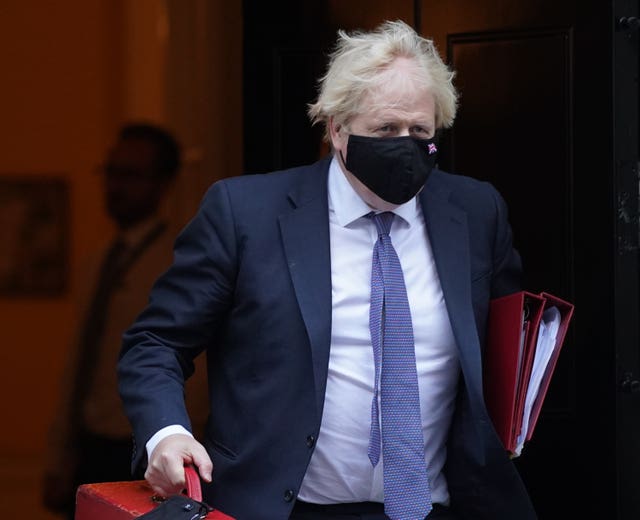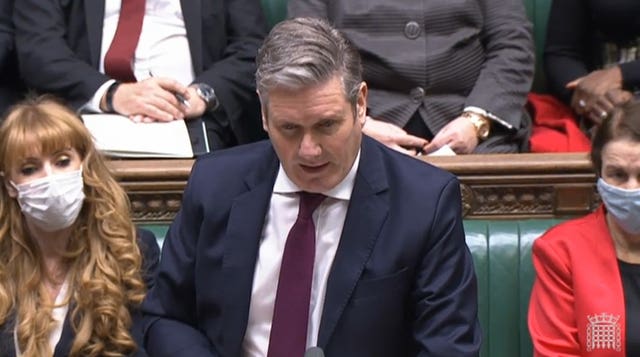The standards row which has engulfed Parliament has been handled poorly and has damaged the Government, a former Cabinet minister has said.
Robert Jenrick spoke out after a dramatic day in Westminster that saw Prime Minister Boris Johnson admit mistakes had been made and reportedly tell his MPs he “crashed the car” over the saga.
The former Communities Secretary said the “checks and balances around the Prime Minister” and advisers should have warned him that his plans to overhaul the standards system were not going to work.
He told ITV’s Peston: “It has been a very difficult two weeks and almost everyone involved would agree that it’s been handled poorly by the Government and it’s damaged the Government to an extent, and it’s damaged Parliament as well.”
“We need to take action now to restore a degree of public trust in the standards in public life, and what you would expect from a Member of Parliament.”
He spoke after the Prime Minister faced questions on multiple fronts over his handling of the crisis.

During Prime Minister’s Questions, Mr Johnson was rebuked by the Speaker, Sir Lindsay Hoyle, as he stood in front of emptier than usual Government benches.
The Government managed to win an amendment to allow proposals on the banning of paid consultancy roles to go ahead, but just 297 MPs backed the move – fewer than half of the total.
Mr Johnson also faced the Commons Liaison Committee of senior MPs, where he admitted mistakes had been made.
And Bloomberg reported he told members of the backbench 1922 Committee of Tory MPs “on a clear road I crashed the car into a ditch” over the saga.
The bruising day for the Government was the culmination of weeks of pressure over standards in politics, prompted by a botched attempt to save former MP for North Shropshire Owen Paterson from suspension.
Mr Paterson had been found to have breached lobbying rules by the Parliamentary Commissioner for Standards but a Government-backed amendment attempted to save him from suspension and overhaul the whole standards process.
The Government U-turned on the idea after backlash and Mr Paterson resigned as an MP, but the saga kicked off a deep dive into standards in public life, with a focus on second jobs.
On Wednesday, Mr Johnson admitted the initial effort to shield Mr Paterson had been an error.
“The intention genuinely was not to exonerate anybody, the intention was to see whether there was some way in which, on a cross-party basis, we could improve the system,” Mr Johnson told the Liaison Committee.
“In retrospect it was obviously, obviously mistaken to think we could conflate the two things and do I regret that decision?
“Yes I certainly do.”
On Wednesday evening, a Government plan to ban paid consultancy work was approved by MPs but Labour said the proposals were a “watered-down” version of what the opposition had put forward.
Tonight, Labour gave the Conservatives the chance to do the right thing and vote to immediately stop MPs working on dodgy second jobs.
They didn’t do it.
The Prime Minister is a coward and the Conservative party is corrupt.
— Keir Starmer (@Keir_Starmer) November 17, 2021
Labour’s proposals called for a ban on “any paid work to provide services as a parliamentary strategist, adviser or consultant”.
Crucially, it also included provisions requiring the Commons Standards Committee to come forward with proposals to implement the ban and guaranteeing time on the floor of the House for MPs to debate and vote on them.
In contrast, the more vaguely worded Government amendment simply described the consultancy ban as “the basis of a viable approach” and supports the work of the Standards Committee to update the MPs’ code of conduct.
Labour’s motion was rejected by 282 votes to 231, majority 51.
While the Government’s amendment on standards was approved by 297 votes to zero, majority 297.
The division list showed four Conservative MPs rebelled to support Labour’s motion – Peter Bone (Wellingborough), Philip Hollobone (Kettering), Nigel Mills (Amber Valley), and Dan Poulter (Central Suffolk and North Ipswich).

Speaking after the vote, Labour leader Sir Keir Starmer told broadcasters: “We put forward a plan of action to clean up politics and strengthen standards in politics.
“And if you can believe it, after two weeks of Tory sleaze and corruption, the Prime Minister whipped his MPs against that plan of action, and, frankly, he just doesn’t get it.”
A Government spokesperson said the vote means “that MPs will be banned from acting as paid political consultants or lobbyists and that MPs are always prioritising their constituents”.
However, Chris Bryant, the Labour chairman of the Committee on Standards, replied on Twitter saying: “Except it doesn’t mean that. We haven’t changed anything yet.”
Mr Bryant added he hoped to have a final report on the committee’s proposed changes ready to present to the Commons in early 2022.
I have written to the Commons Speaker to propose:
1) The Code of Conduct for MPs is updated2) MPs who are prioritising outside interests over their constituents are investigated and appropriately punished3) MPs are banned from acting as paid political consultants or lobbyists pic.twitter.com/3SSQqrKRCG
— Boris Johnson (@BorisJohnson) November 16, 2021
But Mr Johnson may yet come under pressure from his own MPs, many of whom are angry at his attempts to curb their earnings.
Sir Geoffrey Clifton-Brown, treasurer of the 1922 Committee, said there was “dissatisfaction” with the Prime Minister in the Tory ranks.
And speaking to GB News, former minister Johnny Mercer he had “no relationship” with Mr Johnson, despite initially backing him as leader.




Comments: Our rules
We want our comments to be a lively and valuable part of our community - a place where readers can debate and engage with the most important local issues. The ability to comment on our stories is a privilege, not a right, however, and that privilege may be withdrawn if it is abused or misused.
Please report any comments that break our rules.
Read the rules hereLast Updated:
Report this comment Cancel